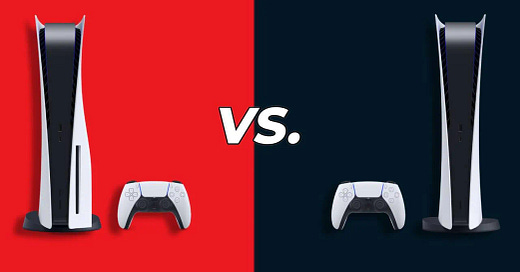
Google Stadia struggled even more than we thought
Google's game streaming service accounted for only 5% of the cloud gaming market in 2022
Stadia’s demise last year didn’t come as a huge shock. Google’s gaming service struggled to find a foothold in the nascent cloud gaming market, but new figures reveal just how little space it was able to carve out for itself.
Statistics shared in a new report by the UK’s Competition and Markets Authority, produced as part of its ongoing investigation into Microsoft’s buyout of Activision Blizzard, suggest Google Stadia enjoyed one of the lowest market shares of all the major cloud gaming services and was resoundingly trumped by Xbox Cloud Gaming.
➡️ The Shortcut Skinny: Stadia’s small share
🤏 Stadia was an even smaller gaming service than many thought
☁ New statistics show it accounted for a tiny share of the game streaming market
🌍 Xbox Cloud Gaming is currently leading the pack by a wide margin
👀 The stats will affect regulators’ view of Microsft’s Activision Blizzard buyout
Google Stadia accounted for only 0 - 5% of the total cloud gaming market in 2022, level with Amazon Luan. PlayStation Plus (or PS Now as it was formally called) made up 10-20% along with Nvidia GeForce Now, while Xbox Cloud Gaming dominated 60-70% of the market.
The year before in 2021, Stadia accounted for 5-10%, Xbox Cloud Gaming for much less at 20-30%, PlayStation for 30-40%, and Nvidia for 20-30%. Amazon Luna’s share isn’t recorded, presumably because its presence was negligible.
The findings are based on several sources of data, including those from the companies themselves and “third-party evidence”.
Although the CMA does clarify these “static measures of market share are unlikely to accurately reflect the relative strengths of different cloud gaming services providers”, it does provide us a glimpse into the growth and presence of Google’s ill-fated streaming service. Stadia was already fumbling by 2021, only two years after its release, and shrunk to a tiny size by the time it was eventually shuttered.
The CMA attributes that fall to Stadia’s poor content library. “We provisionally believe that content is particularly important to the success of a cloud gaming service, particularly considering Google’s failure with Stadia, which our evidence suggests was caused at least in part by a lack of gaming content, which was connected to its use of a Linux OS,” the report says.
The findings will have significant implications for the CMA’s study of Microsoft's takeover of Activision Blizzard. As well as highlighting the popularity of Call of Duty – which Microsoft has repeatedly responded to by promising not to make the franchise an Xbox exclusive – regulators have also voiced concern over the company’s stranglehold of the cloud gaming market. These statistics will only worry regulators further, as Xbox’s streaming growth looks to be already on the up.
The CMA’s report also notes that Microsoft estimated its own global market share for cloud gaming services in 2021 amounted to only 0-10%, behind that of Nvidia and Facebook Gaming (which presumably means the many arcade games integrated into the social media platform). Notably, CMA excluded Facebook Gaming from their analysis since it isn’t a streaming service, and found from its own data collection that Microsoft vastly underestimated its own share of the market, and overestimated Nvidia’s.
Much of Xbox Cloud Gaming’s growth will stem from its inclusion in Xbox Game Pass Ultimate – it’s a free perk and doesn’t require an extra subscription fee. It appears the CMA has recorded users as possessing the streaming service even if they don’t actually use it as part of their Game Pass subscription, which could lead to inflated real-world player numbers. Maybe people will be more likely to play more games via the cloud when the Xbox Streaming Stick finally materializes.
In the meantime, you can hop aboard what’s apparently the world’s most popular gaming streaming service for a bit of money off with our Xbox Game Pass discount code.













